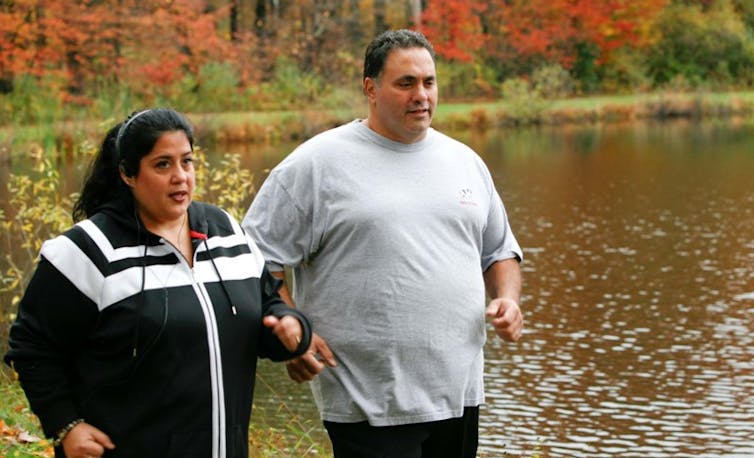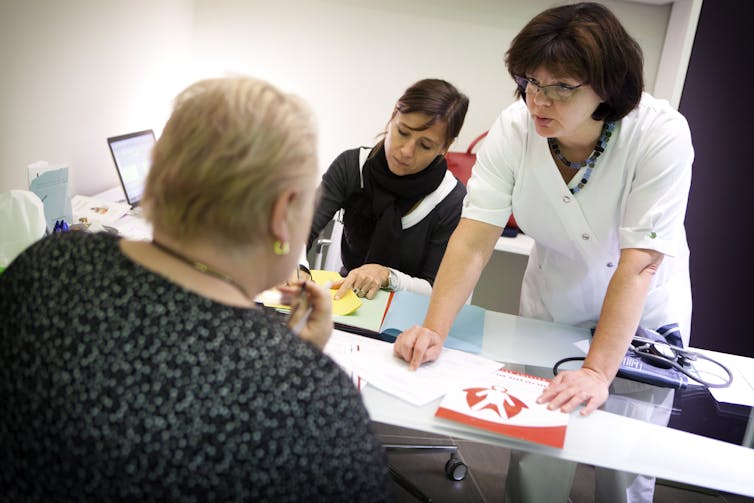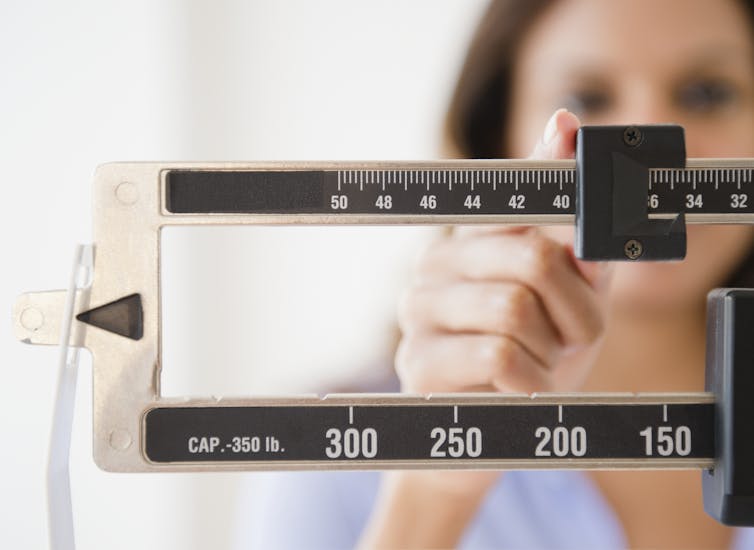
Experts in autocracies have pointed out that it is, unfortunately, easy to slip into normalizing the tyrant, hence it is important to hang on to outrage. These incidents which seem to call for the efforts of the Greek Furies (Erinyes) to come and deal with them will, I hope, help with that. As a reminder, though no one really knows how many there were supposed to be, the three names we have are Alecto, Megaera, and Tisiphone. These roughly translate as “unceasing,” “grudging,” and “vengeful destruction.”
I feel the need to share this because, although unrelated to current events, it is profoundly accurate – and it is something I never expected to see, hear, read, in my lifetime. It is jaw-dropping.
================================================================
A doctor’s open apology to those fighting overweight and obesity

UConn Rudd Center for Food Policy & Obesity, CC BY-SA
J. David Prologo, Emory University
Obesity has emerged as a significant risk factor for poor outcomes in patients infected with COVID-19. Based on how doctors and others in health care have previously treated patients with obesity or overweight conditions, my guess is that many will respond by declaring: “Well, it’s their own fault for being overweight!”
In the spirit of recognizing that people who struggle with weight loss include our family and friends, let me propose a different sentiment.
To those who we have shamed for having excess body weight and/or failing diets: “You were right, and we are sorry. After giving you undoable tasks, we ridiculed you. When you tried to tell us, we labeled you as weak and crazy. Because we didn’t understand what you were experiencing, we looked down on you. We had never felt it ourselves. We did not know. And for that, we apologize.”

BSIP/Universal Images Group via Getty Images
‘Fat shaming’ doesn’t work
This is just one version of the apology we owe our fellow human beings whom we told to lose weight using diet and exercise. Then, when it didn’t work, we blamed them for our treatment plan failures and smothered their feedback with prejudice and persecution.
As a physician and researcher, I have worked in this space for many years. I have witnessed firsthand the life-altering power of preexisting ideas, judgments and stereotypes. I have seen how unfounded, negative ideas are woven through virtually every interaction that those struggling with weight loss endure when seeking help.
And there are tens of millions of them. The Centers for Disease Control and Prevention classifies more than 70% of U.S. adults as overweight, and more than 40% as obese. Those numbers continue to climb, and even when some manage to lose weight, they almost always gain it back over time.
Rash judgments
To illustrate, imagine that I am your doctor. You have a body rash (which represents the condition of being overweight or obese), and you make an appointment with me to discuss a treatment plan.
During your visit, my office staff uses stigmatizing language and nonverbal signals that make it clear we are annoyed at the idea of dealing with another rash person. We invoke a set of assumptions that dictate the tone of our relationship, including the notions that you are lazy or ignorant or both. You will sense my disgust, which will make you uncomfortable.
Unfortunately, health care providers commonly treat patients who struggle with weight loss by assigning stereotypes, snap judgments and ingrained negative attributes – including laziness, noncompliance, weakness and dishonesty.
After this uncomfortable exchange, I will prescribe a treatment program for your rash and explain that it’s quite straightforward and easy to use. I will point you to several resources with pictures of smiling people with beautiful skin who never had a rash to emphasize how wonderful your outcome will be. “It’s just a matter of sticking to it,” I will say.
Back at home, you are excited to start treatment. However, you quickly realize that putting on the cream is unbearable. It burns; your arms and legs feel like they’re on fire shortly after you apply the treatment. You shower and wash off the cream.
A dismal conversation
After a few days, you try again. Same result. Your body will not accept the cream without intolerable burning and itching. You return to my office, and we have the following conversation:
You: Doctor, I cannot stick to this plan. My body cannot tolerate the cream.
Me: This is exactly why doctors do not want to deal with rash people. I’m giving you the treatment and you won’t stick to it. I put the cream on myself every morning without an issue.
You: But you don’t have a rash! Putting this cream on when you have a rash is different than putting it on clear skin. I do want to get rid of my rash, but I cannot tolerate this cream.
Me: If you don’t want to follow the treatment, that’s up to you. But it’s not the cream that needs changing. It is your attitude toward sticking with it.
This exchange illustrates prejudical behavior, bias and a disconnect between a provider’s perceptions and a patient’s experience.

Jamie Grill/JGI via Getty Images
Prejudice and bias
For someone who wants to lose weight, the experience of a diet and exercise prescription is not the same as for a lean person on the same program. Perceiving another person’s experience as the same as one’s own when circumstances are different fuels prejudice and bias.
That night, though, you can’t help but wonder: “Is something wrong with me? Maybe my genes or thyroid or something? The cream seems so fun and easy for everyone else.”
At this point, the blame unconscionably lands on the patient. Despite an undeniable explosion of this rash, and abysmal treatment adherence rates while we have been touting the cream, we stubbornly maintain it works. If the rash is expanding, and hundreds of millions of people are failing treatment or relapsing every day, well – it’s their own fault!
As time goes on, you feel increasingly discouraged and depressed because of this untenable situation. Frustration wears on your sense of optimism and chips away at your happy moments. You have this rash and you can’t tolerate the treatment plan, but no one believes you. They judge you, and say you choose not to use the cream because you lack willpower and resolve. You overhear their conversations: “It’s her own fault,” they say. “If that were me, I would just use the d#$% cream.”
This is the very definition of prejudice: an opinion, often negative, directed toward someone and related to something that the individual does not control. Although it has been extensively demonstrated that the causes for overweight and obesity are multifactorial, the myth that it’s the patient’s fault is still widely accepted. This perception of controllability leads to the assignment of derogatory stigma.
A setup for failure
That evening you sit alone. You think there’s not a single person on the planet who believes your body won’t tolerate this treatment. Society believes you brought this on yourself to begin with; there doesn’t seem to be a way out.
We have driven those with overweight and obesity conditions to this place far too many times. We have set them up to take the fall for our failed treatment approaches. When they came to us with the truth about tolerability, we loudly discredited them and said they were mentally weak, noncompliant or lazy.
[Deep knowledge, daily. Sign up for The Conversation’s newsletter.]
So where do we go from here? If we agree to stop stigmatizing, stereotyping and blaming patients for our treatment failures, and we accept that our current nonsurgical paradigm is ineffective – what takes its place?
For starters, we need a new approach, founded on respect and dignity for patients. A fresh lens of acceptance and suspended judgment will allow us to shift our focus toward treatments for the body, rather than “mind over matter,” which is a concept we use for no other medical condition. A perspective based in objectivity and equality will allow caregivers to escape the antiquated blaming approach and perceive those with overweight or obese conditions in the same light as those with other diseases. Only then will we finally shift the paradigm.![]()
J. David Prologo, Associate Professor, Emory University School of Medicine, Emory University
This article is republished from The Conversation under a Creative Commons license. Read the original article.
================================================================
Alecto, Megaera, and Tisiphone, I point out that The Conversation operates on a Creative Commons license (material is free to share, with attribution), and I hope everyone will feel free to share this. I wish someone would share it with Bill Maher (and then we would see how actually committed he is to science over prejudices, wouldn’t we.) You ladies can spread it too. Thanks.
The Furies and I will be back.
9 Responses to “Everyday Erinyes #231”
Sorry, the comment form is closed at this time.

Actually, there are many clinicians that use a mind over matter view for persons with chronic pain, especially if from relatively rare conditions they are unfamiliar with.
And Joanne, thanks for illuminating the kind of experience that also goes with those erroneously labeled hypochondriac, etc., when doctors were faced with a rare condition, symptoms or treatment experience they did not recognize (also went with allergic reactions to medications or dosage intolerance as recent as less than two decades ago).
I hadn’t thought of this subject..it’s sad.
Respect and dignity for those who need it, before and after consultation w/dr.
Thank you for bringing this awareness to the table.
Thanks, Joanne (and Furies) for this excellent post.
One sad thing is that obesity sets one up for so many other medical problems. And, it is difficult to be at a restaurant (once upon a time) and see the heaviest people there eating the big ice cream sundae, for dessert. It sets my mind on the stereotype.
Dr. Prologo is right, however.
Awful to imagine how some doctors and their staff can be so cruel/rude to patients that have weight issues, especially when they’re in there to help them with a medical issue, like you wrote about, having a rash.
I applaud how Dr. Prologo’s suggest that Doctors/patients take a different view on how to address this life threatening health issue.
I have never experienced the issue of excess weight. My mother, (bless her) after she experienced having a heart attack, had to have heart surgery. It was after the surgery she started gaining weight and then on top of that was diagnosed with type 2 diabetes. Like one thing after another.
I feel for people who have weight issues. I worry what it will do to their health. That it may shorten their life span.
Hopefully doctors, even insurance companies will do more to help people train themselves to get on the wagon to try to get on a better eating plan and to slowly start exercising. Empathizing that it’s for their health. Plus monitor them to make sure other issues don’t bop up. Plus praising them for what they’ve accomplished.
Great post. Thanks Joanne
Thanks! Way Late Hugs!
as a physician, most of realize it is not a choice to be fat…no one wakes up and says “I wanna be fat” or “I’m going to eat like a pig so I can grow too heavy”……however, because of the risk of overweight and obesity we often and should always try to help our patients obtain a safer, healthier weight (more than Covid, heart disease, cancer, stroke, renal failure, chronic pain, etc)…..I hope I have never fat shamed anyone…..but I want my patients to have any and all options to lose weight….
even if one is not overweight/obese I always talk about healthy eating and activity…..
Sadly, I have to admit to have been guilty of this in my younger years.
Medical school certainly helped, but I’m still working on it. (Especially since I have added a few more pounds than I want.)
Well, try not to beat yourself up (I know, that’s easier said than done. But it doesn’t help and may hinder.)
This article touches upon the complexly interacting myriad of reasons why people become obese and the fact that the average fat person with the one simple cure for their problem simply doesn’t exist. And that the failure of the suggested simple cure and the judgement that comes with it often exacerbates the problem.
Thanks for sharing this article with the Furies and us, it should help us all to be a little less judgemental of a problem which now 40% of the population has to deal with.